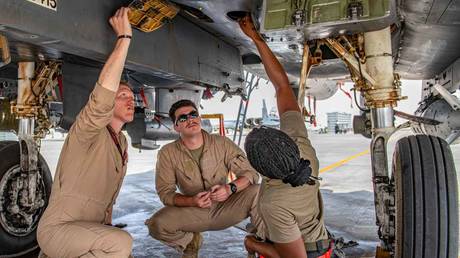
A study has found that military air crews suffer high rates of melanoma and other cancers
US military aviators contract various forms of cancer far more frequently than Americans at large, a long-awaited Pentagon study has revealed, confirming the suspicions of pilots and surviving family members who had long suggested that their disease and death rates seemed unusually high.
The investigation, which was reported by media outlets on Sunday, found that overall cancer rates were 24% above normal for members of air crews who served between 1992 and 2017. Rates were 87% higher than average for melanoma and 39% higher for thyroid cancer. Male pilots and crewmen face a 16% higher rate of prostate cancer, while female air crew veterans have a 16% higher rate of breast cancer.
The multi-year study, which was based on health outcomes for nearly 900,000 service members, also revealed that members of ground crews had elevated risks of various cancer types, including a 19% higher rate of brain cancers, a 15% higher rate of thyroid cancers and a 9% higher rate of kidney or renal cancers. The Pentagon acknowledged that its evaluation likely undercounted cancer cases because its data was unreliable for earlier generations of pilots.
Congress ordered the broad study in 2021, after years of lobbying by former military pilots and family members who suspected for years that exposure to potential carcinogens in jet fuels, radar systems and other possible hazards was killing many veterans. Now that the initial review has confirmed high cancer rates, a second phase of the study will examine possible reasons.
A narrower study completed in 2021 looked only at US Air Force pilots and compared their cancer rates to those of service members in general. That review, which encompassed nearly 35,000 pilots and crew members who served between 1970 and 2004, found that rates of testicular, prostate and skin cancer were 23-30% above normal. Pilots who flew the F-100 Super Sabre, America’s first supersonic fighter jet, were “more likely to be diagnosed with, and die from, cancers of the colon and rectum, pancreas, melanoma, skin, prostate and brain,” the earlier assessment said.
The latest study comes to light after the US Air Force launched an investigation last month into cancer risks for service members who worked in America’s nuclear missile silos. A preliminary review showed high rates of lymphoma among missileers who worked at Montana’s Malmstrom Air Force Base.
READ MORE: US Navy sued over ‘toxic secrets’




